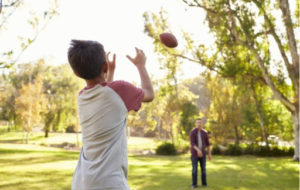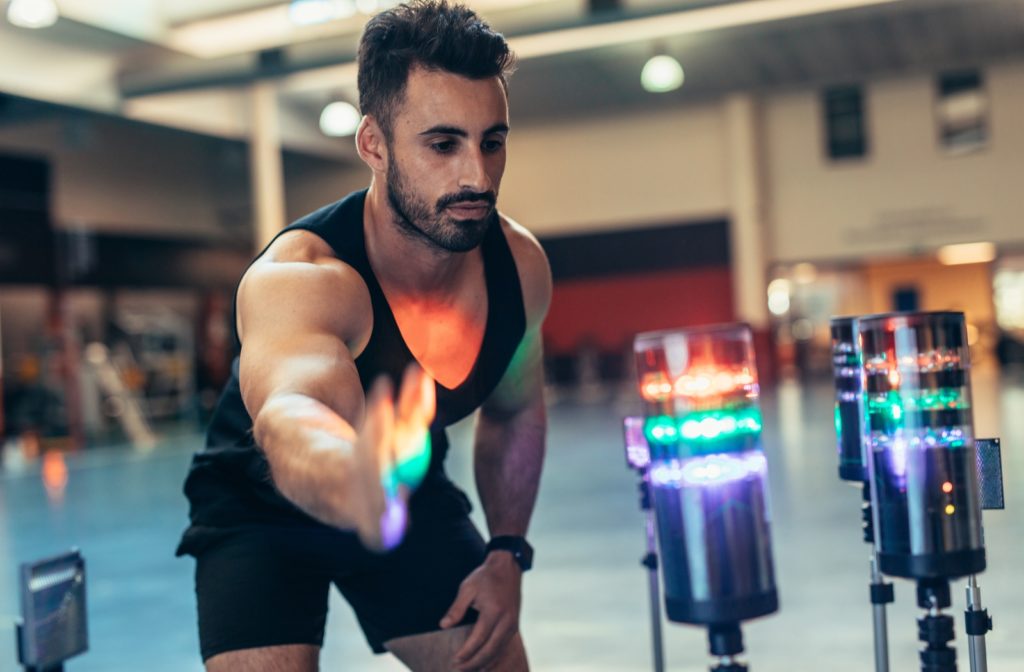If you play sports, you know how important good vision is. If you struggle to keep track of a ball or catch it, you may benefit from sports vision therapy. Your optometrist can do more than check your eyesight; they can help retrain your visual skills, helping you improve your play.
Continue reading to learn more about sports vision therapy, including what it is, how it helps, and what you should expect.
What is Sports Vision Therapy?
Vision is essential in many sports, but it’s more than seeing clearly. Doctors estimate almost 80% of perceptual input in sports comes from your vision. With multiple fast-moving elements, a visual problem can affect your ability to perform well in your sport.
Sports vision therapy aims to improve the visual skills needed for whatever sport you play. Whether it be basketball, baseball, football, or hockey, your optometrist can help you play at your best.
After testing your visual skills, your eye doctor can determine what you may be having trouble with. Over time, they can help you retrain your weakened skills to improve your overall sports performance. What skills can this therapy improve?
What Can Sports Vision Therapy Improve?
Sports vision therapy can help train and improve the visual skills needed for your specific sport. You need fast and accurate vision for many sports, but your performance may suffer if your visual skills aren’t up to par.
Sports vision therapy helps by retraining your visual skills through various exercises. Improving these weaknesses can improve your overall vision and sports performance. Depending on your sport, you’ll have specific skills to improve, but some may include:
Visual Reaction Time
Visual reaction time is what allows people to react quickly during any situation. This reaction is the amount of time it takes for stimuli (a ball moving forward) to travel from your vision into a physical reaction (hitting the ball with a bat). It’s essential for any action taken during a sport.
Improving your visual reaction time can help you respond to changing events in your sport faster and more efficiently.
Binocular Vision
Binocular vision is the ability to focus on an object with both eyes, creating a single image. With weak binocular vision, people are likely to have difficulties with depth perception and visual measurement of distance.
Depth Perception
Depth perception is your ability to see in 3 dimensions (length, width, and depth) and judge the distance of an object. Accurate depth perception requires binocular vision.
In sports, you use depth perception when judging the distance between yourself and an opponent, ball, boundary line, or more. Under or overestimating these distances may mean your depth perception is weak.

Visual Tracking
Visual (or eye) tracking is the process of following an object with your eyes. In sports, you need the ability to follow a ball without losing your balance. Being able to follow an object effectively with your eyes is necessary for many sports.
Eye Focusing
Eye focusing is the ability to focus your vision clearly and effectively. You have an automatic focusing system that helps your eyes see clearly. Looking up, down, or in another direction requires the eyes to change focus rapidly.
Without proper eye focusing ability, it can lead to:
- Blurred vision
- Inconsistent work
- Reduced accuracy
- Difficulty maintaining clear vision
Peripheral Vision
Peripheral vision is how you can see objects around you without turning your head or moving your eyes. It helps you see a ball, teammate, or another object while focusing on another target during a game.
You need strong visual skills to succeed in your sport. Missing a pass in a crucial situation can lose you a game. Your optometrist can help you improve your weaknesses with sports vision therapy, but how effective is this training?
How Effective is Sports Vision Therapy?
Vision can affect anyone’s sports performance, especially sight clarity, motor performance, and information processing. You need binocular vision to process all of the information around you during a basketball game.
If someone struggles in sports because of their vision, can they improve their performance through vision training? How effective is sports vision therapy?
Binocular vision is crucial for sports. With a 3D image, you can judge distances and remember accurate information about the environment around you. A study on binocular vision and sports vision therapy shows the effectiveness of this training.
The study discovered that after 8 weeks of visual therapy, several skills improved. Skills stayed improved 4 weeks after program completion, showing they weren’t temporary improvements.
If your optometrist offers sports vision therapy, you can see the improvement for yourself. What should you expect during your appointments?
What Should You Expect in Your Appointments?
Before creating a customized plan for you, your eye doctor will test 10 relevant visual and sensory performance skills. With the results of these tests, you’ll receive a report of your strengths and areas for improvement.
Your improvement plan will include several individually prescribed and monitored exercises to strengthen your brain and eyes’ connection. This plan includes weekly in-office appointments to teach you the exercises you’ll complete every day at home.
The length of your improvement plan varies on your goals and needs. Some may need weeks of improvement, while some may need several months. Follow-up appointments and close monitoring of your progress will show how far you’ve come through sports vision therapy.
Improve Your Sports Performance
If you want to improve your play, consider sports vision therapy. With the right training, you can become a better player in your chosen sport. If you’re interested in sports vision therapy, contact your optometrist.



